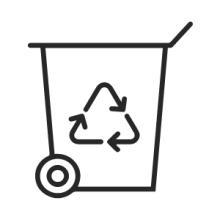DIY waste is not the same as the household waste. It is classed as ‘construction and demolition’ waste and falls under the category of ‘industrial’ waste.
This type of waste includes:
- Timber - including kitchen units, fitted furniture, doors, laminate flooring and floorboards, sheds, fence panels, decking, garden structures
- Rubble - including sinks, toilets, bricks, concrete, stones, tiles
- Flat glass - including glass from windows and doors, greenhouses, shower screens
- Plasterboard - all plasterboard and plaster
- General - including roofing felt, plastic guttering, fibreglass insulation
